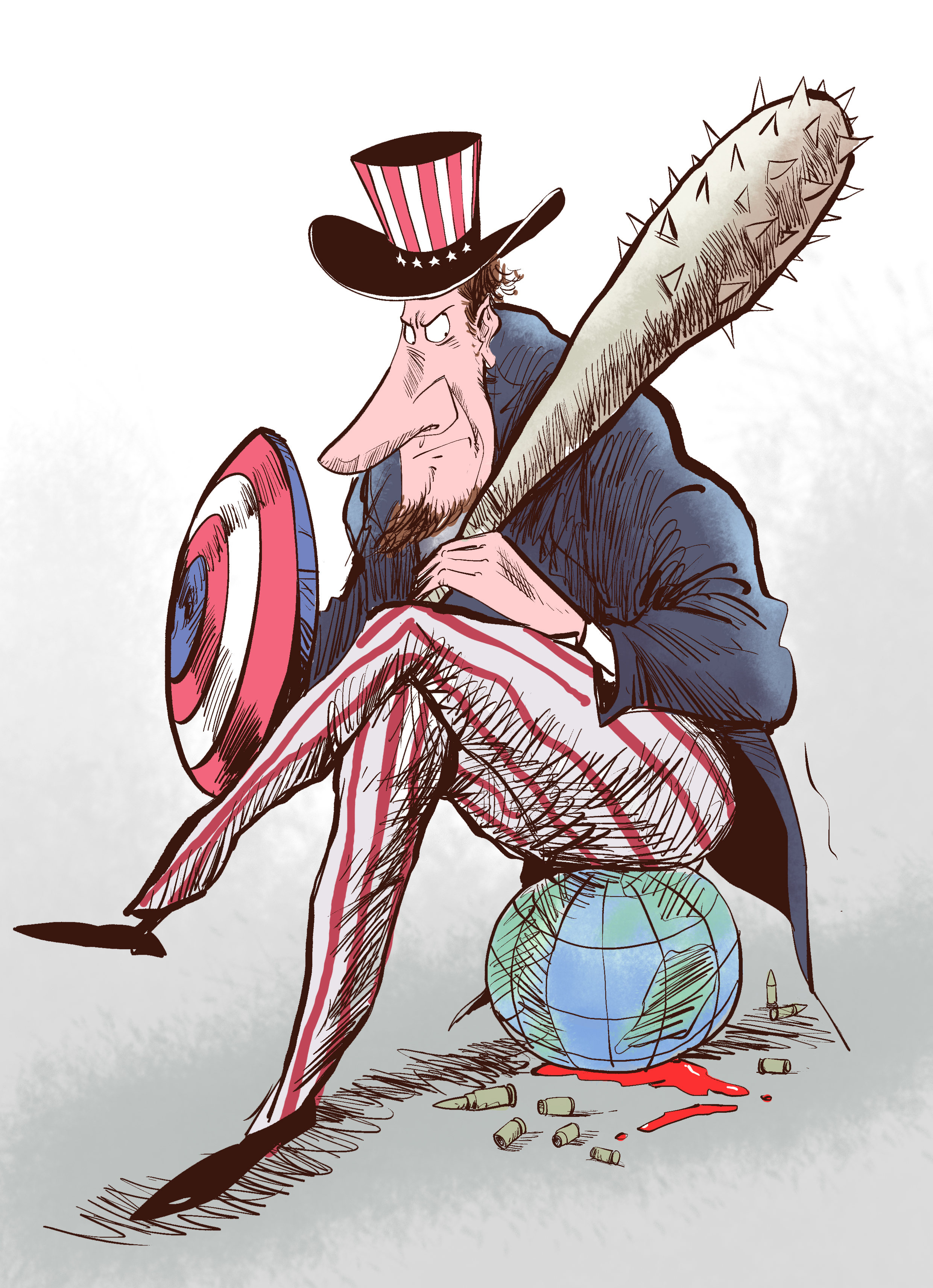LI XING and PENG BO: US diplomacy blamed for refugee crisis in Europe

Uncle Sam at ease
Cartoon by Gou Ben; Poem by Long Yuan
As refugees flood Europe’s gates,
Uncle Sam kicks back and waits.
As the world around him burns,
He doesn’t look the least concerned.
He is the guardian of human rights, he claims,
But he will accept no blame
For the many killed and maimed
In the course of this hegemonic game.
Recently, the ongoing turbulence in the Middle East and North Africa triggered a flood of refugees from Syria and Libya into Europe, leading to the most severe refugee crisis the continent has seen since World War II.
According to statistics from the Office of the UN High Commissioner for Refugees, more than 500,000 refugees and immigrants had entered Europe through the Mediterranean Sea by September. In the first eight months of this year, more than 383,000 refugees registered in Greece, of which 45 percent came from Syria.
The root cause of the Syrian refugee crisis is US intervention, which has aggravated the political unrest, triggered the civil war and led to increasingly rampant extremism. An examination of the diplomatic history of the US will offer insight into the refugee problem.
After WWII, the US built its hegemony on three pillars. The first is the Bretton Woods System, which made the US dollar another reserve currency in addition to gold. The second is the global and regional collective security framework covering America, Europe and Asia designed to contain the spread of communism, and the third is the Eurasia-centered global trade network.
The US has been trying hard to uphold the post-WWII international order to keep its dominant position and maintain unequal political and economic relations. And it regards the rise of emerging nations as a threat to the old order.
In the post-Cold War era, the US endeavored to safeguard the united and free world capitalist alliance while handling differences with other allied countries in global and regional affairs.
At the same time, the US began to encourage policies that reflect American values, such as unilateralism, interventionism and democracy as well as responsible sovereignty, which exerted great influence on the development of international relations. After the Sept. 11 attacks, the US led the War on Terror, but some of its policies brought new threats to global security. And the current refugee problem is one example.
In the course of its involvement in modern international relations, the US has become accustomed to taking advantage of human rights issues to further its foreign strategies and solidify national hegemony. It intervenes in the internal affairs of other countries regardless of the actual needs of their people while advertising itself as a defender of human rights. After the US failed to find weapons of mass destruction in Iraq, it attempted to legitimize the war as a humanitarian intervention, but its actions ultimately brought chaos to the country.
Since the Sept. 11 attacks, the US has regarded Syria as an obstacle to its “Greater Middle East Initiative,” a plan to transform the Muslim countries in the Middle East into democratic societies. US leaders argue that Syria is one of the main sponsors of terrorism. Moreover, Syria has always sided with Hamas and Hezbollah on the Palestine-Israel issue, which has disrupted the US democratic transformation strategy. As a result, the US has repeatedly pressured Syria through political, economic and diplomatic means.
The US is mainly responsible for the refugee crisis in Europe, but it has adopted a negative attitude toward resolving it. And the crisis is evolving into a global problem.
Though the US bowed to pressure from its European allies and Human Rights Watch and agreed to accept 10,000 Syrian refugees, this is just a drop in the bucket. It has refused to take in more refugees for the security of the American people. However, such a practice that focuses only on national interests while neglecting the rights of people in other nations goes against the universality of human rights.
Li Xing and Peng Bo are from the Research Center on Development and International Relations at Aalborg University in Denmark.
